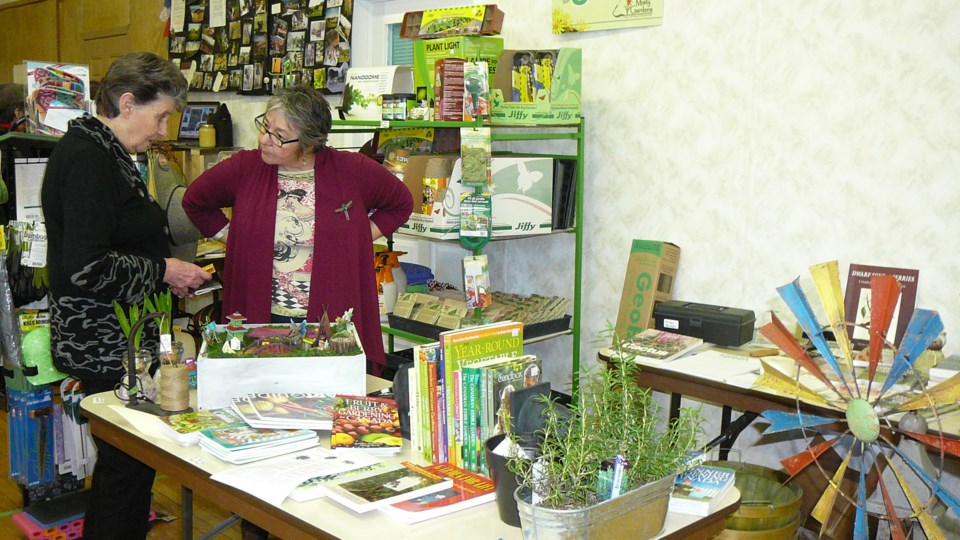The first ever annual Seedy Sunday was held in Humboldt on March 8 and it was about more than just sharing and learning about seeds. Seed experts are trying to get the word out about seeds being in the public domain, despite a rising trend of genetic ownership.
“These events are community-based initiatives that happen around Canada to celebrate seeds, where people can share, swap, and learn about saving seeds,” said Rachelle Ternier of Prairie Garden Seeds and an organizer of the event. “It’s about encouraging seeds to remain in the public domain. Nobody can own them.”
When scientists and private companies invest in specific genetic research on seeds, they place patents and copyright the genetic traits they breed. According to Ternier, however, those individuals or companies were not responsible for the thousands of years of growing and genetic changes – deliberate or otherwise – that took place prior to their modifications. As such, they shouldn’t have any right to lay claim to those breeds of seeds or plants just because of the small amount of genetic work they added to it.
“People as a collective can take back power in seed saving,” said Ternier.
It was a major theme for the day and one of the major motivations that Ternier and her father, Jim Ternier, had for organizing this event. There were speakers talking about seeds, food, and health, an activity area for kids, and even an old flour mill that was used to grind grain and bake bread and cookies on the spot. Following the event, they also showed a documentary and had a potluck supper.
Some of the vendors present included Misty Gardens, Kids Kitchen, Plant Resources Canada, Farmers Market, Blazing Star Wildlife, and many more. The general idea was to show people the massive varieties of seeds available and to encourage them to start growing something of their own, even it’s just a tomato plant on the balcony.
“It’s fun to show people all the different things you can grow and save seeds for,” said Ternier. “It’s fascinating to know that food can come from one seed, which can make thousands more seeds … it’s important we all have access to seeds because food is the most basic thing we need for living and seeds are the source of all that.”
It’s for reasons like these that Ternier says nobody should be allowed to own seeds or a plant variety. There’s a history of work that’s been done to all seeds that no one person can lay claim to, regardless of what they’ve added to it most recently. As such, Ternier says that’s why she believes only public institutions should be the ones to do genetic work on seeds. That way they can’t claim ownership and can instead do it because they love it and are willing to share what they breed.
“Seeds are living and one shouldn’t be able to patent life,” she said. “Seeds should be able to grow without intervention because these things have grown for years and years without us.”
Ternier is obviously passionate about the potential seeds carry, but it’s more than just that. She says they also carry their own stories because the food we grow “maintains the culture of communities.” For example, she said someone could have moved from Russia to Humboldt many years ago and brought some seeds that grow well here in Saskatchewan with him or her. Those seeds and plants will then carry with it that family’s history and stories.
Moreover, by keeping seeds free and in the public domain, it reinforces a decentralized system, which Ternier says enhances and strengthens the abilities of seeds to survive. If everything were centralized because of patents and copyrights, those seed breeds become vulnerable to whatever might happen to the centralized system.
“Seed savers and gardeners really recognize the importance of maintaining that biodiversity,” she said. “It’s really amazing work to do and these Seedy Sundays and Saturdays really showcase that biodiversity and that give and take among people.”
Ternier is of course referring to the seed swap tables they had set up during the event. She says the act of saving, swapping, and sharing seeds helps to create a resilient local food system.
“I feel wealthy. I can’t eat my cash, but I can certainly eat my seeds,” said Ternier.
Seedy Sunday is an annual event that isn’t limited to Humboldt. It’s already happened in Winnipeg, Regina, Moose Jaw, and Saskatoon and will continue to happen in various communities across Saskatchewan each year.




